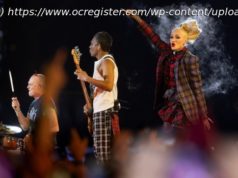Frei. Wild has become one of the most popular bands in Germany. But critics say the group fosters anti-immigrant sentiment and right-wing nationalism.
NATZ, Italy — By the time Frei. Wild took the stage at Alpen Flair, a three-day music festival in northern Italy, the sun had disappeared behind the forested peaks of the surrounding Alps. Most of the 20,000 audience members had traveled over 100 miles from Germany to see the band. The crowd was overwhelmingly white and largely male, and many fans shouted along as the band launched into one of its most controversial songs, “Südtirol.”
The song celebrates Frei. Wild’s home region of South Tyrol, where the festival was taking place, a largely German-speaking enclave that was passed to Italy from Austria-Hungary after World War I. “I won’t tolerate any criticism of this sacred land, our homeland,” the band’s heavily tattooed singer, Philipp Burger, sang. An eagle like the one on the region’s flag flashed on a large screen onstage.
Frei. Wild (pronounced FRY-vilt) has become one of the most contentious and successful bands in Germany, where its lyrics about loving one’s homeland have resonated with people who want to challenge the postwar taboo against public expressions of national pride. The band sings in German, and its music is a punk-inflected variant of “deutschrock,” a form of German rock music. But a South Tyrolean identity allows the group to voice nationalist sentiments in German, for a largely German audience, while partly avoiding the backlash that a German band would encounter for making similar statements.
The band’s most recent album, “Rivalen und Rebellen,” (“Rivals and Rebels”) went to the top of the German-language charts in Germany and Austria this spring, and it is the second best-selling album in any language in Germany this year. Many of the group’s tour dates, which included stadium audiences as large as 12,000 people, were sold out.
With songs like “Südtirol” and “Land der Vollidioten” (“Land of Complete Idiots”), which rails against the removal of crosses from schools out of respect for non-Christian children, critics in Germany have argued the band helps to foster anti-immigrant sentiment and right-wing nationalism. The musicians argue they are merely singing about their personal experiences, and that their reputation as a far-right band is a media distortion.
In one song, “Wahre Werte,” or “True Values,” Mr. Burger sings that “language, traditions and religion are the values of the homeland/Without them we will go under.” In an interview, Mr. Burger said he had titled one recent song “Antiwillkommen” (“Anti-Welcome”) to be provocative. After Chancellor Angela Merkel’s decision to allow large numbers of refugees to come to Germany in 2015, the government encouraged a “willkommenskultur,” or “culture of welcoming.”
A recent article in Der Spiegel, the German newsmagazine, described the band as “sounding like the soundtrack to the party platform of the AfD,” referring to the right-wing populist Alternative for Germany party, which landed a surprising 13 percent of the vote in national elections last year. The band’s recent German tour was met with protests in several cities.
Peter Söder, 52, and his wife, Claudia, 44, traveled to South Tyrol from the southern German state of Baden-Württemberg to see the band at Alpen Flair. “Frei. Wild isn’t just entertainment and fun, it’s also political,” Mr. Söder said. “The lyrics capture the zeitgeist in Germany,” he said.
Smoking a cigarette in the festival’s backstage area, Mr. Burger recounted how he and three acquaintances — Christian Fohrer, Jochen Gargitter and Jonas Notdurfter — formed the band in 2001, inspired by the Ramones, Guns N’ Roses and Böhse Onkelz, a German rock group that has also been accused of extreme right-wing sympathies. As a teenager, Mr. Burger sang in a neo-Nazi band called Kaiserjäger — a decision he now describes as a “mistake.” Although all of Frei. Wild’s members live in or around Brixen, Italy, a picturesque town near the Austrian border, they gradually built an audience by playing in clubs and festivals in Germany.
Mr. Burger explained that the band focused on Germany because it has a much larger market for German-language music than Italy. With their message of taking pride in one’s homeland, the band was able to appeal to nationalists in both countries — as well as in Austria and Switzerland.
The group’s success has been met with outrage from musicians, activists and politicians in Germany. In 2012, a journalist accused Frei. Wild on a TV talk show of acting like a neo-Nazi band, setting off a wider discussion about the band’s ideological position. When the band was nominated the following year for an Echo Prize, the German equivalent of the Grammys, other acts threatened to boycott the ceremony and the nomination was rescinded.
Mr. Burger argued that the band’s reputation as a right-wing populist act was largely a creation of the media, which misrepresents and misconstrues his lyrics. The singer, who sports a severe undercut and speaks with a husky rasp, said that most of the band’s songs were personal expressions of “fears, hopes, disappointments, feelings of thankfulness to my family, and about South Tyrol.”
Sven-Christian Kindler, a German lawmaker who was attacked by a right-wing extremist in 2014 after he spoke against Frei. Wild’s lyrics, argued in a telephone interview that Mr. Burger deliberately used ambiguous codes to appeal to far-right fans. “It’s the classical strategy of right-wing radicals,” said Mr. Kindler, a member of the Greens.
As an example, he pointed to the song “Gutmenschen und Moralapostel” (“Do-Gooders and Moralizers”), which complains about the “supermen of the century,” who have decided that “people should hate themselves/Just so history, which brings in money, isn’t put to rest.” Mr. Kindler described the lyrics as “anti-Semitic codes.”
In an email, Mr. Burger said that Mr. Kindler’s accusation was “dumb, malicious, wrong,” and that the lyrics were in fact about “warmongers, corporate emperors,” politicians and “media agitators.” He also argued that the band was pro-Israel, has Jewish fans and has visited Israel many times.
Mr. Kindler said that Frei. Wild fit into the strategy outlined by the “New Right,” a loose movement of political intellectuals in Germany that believes right-wingers need to establish a “cultural hegemony” in order to bring their politics into the mainstream. The band, he said, “is bringing a racist, xenophobic, nationalist, ethnic thinking into the heads of young people through their music.”
Thorsten Hindrichs, a musicologist at Johannes Gutenberg University Mainz, said in a telephone interview that Frei.






